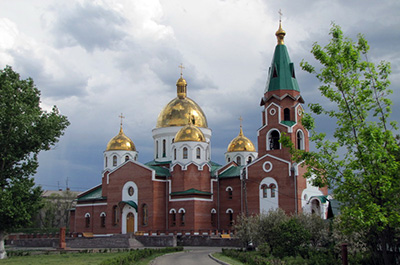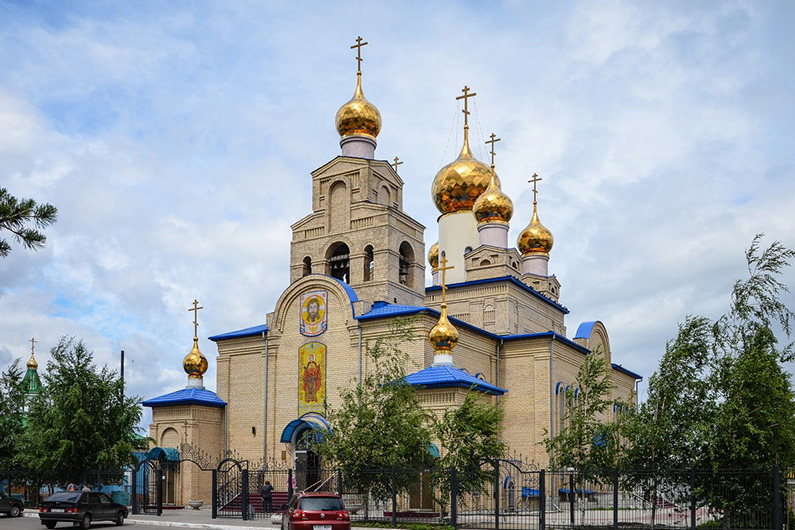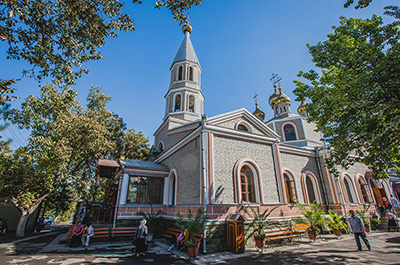
Patriarchal sermon before the rite of forgiveness in the Cathedral of Christ the Savior
- 18.03.2024, 22:42
- Новости на английском языке

On the evening of March 17, 2024, on the Week of Cheese, the remembrance of Adam’s exile (Forgiveness Sunday), His Holiness Patriarch Kirill of Moscow and All Rus' prayed at Vespers and led the rite of forgiveness in the Cathedral of Christ the Savior in Moscow. After the dismissal of Vespers, His Holiness delivered a sermon.
In the name of the Father and the Son and the Holy Spirit!
With this service, dear brothers and sisters, we enter the field of Great Lent. This important event occurs annually, and each of us has the experience of going through the great field of self-restraint in food and behavior, and expanding the prayer rule. All these measures that the Church offers to a person entering the field of fasting pursue one goal - a change for the better. After all, a person can change for the better or for the worse, which means that the task for everyone during Lent is to change for the better.
But in order for this process to really take place, it is necessary first of all to define goals and objectives. One of the tasks, especially in the first week of Lent, is that through prayer, through some kind of introspection, that is, analysis of our own life, our thoughts and actions, we can accurately diagnose our spiritual state. No one will do this for us. Sometimes we resort to the help of priests and confessors, we do the right thing. But even the most experienced priest will not be able to penetrate into the depths of the soul if the person himself does not want this, if he does not reveal his thoughts.
This happens for various reasons: some are shy, others don’t have the skill. But even if you do not have the strength to reveal your thoughts to the priest in confession, then everyone can do this before the image of God and, having understood their weaknesses, their sinful inclinations, their bad deeds, do everything in order to free themselves as much as possible during Lent. heavy weights of sin that pull a person to the ground and prevent him from soaring to heaven.
This is quite difficult work, it requires the ability to introspect, critically perceive one’s own personality and this is the most difficult thing. Well, to be honest, when we enter into a conflict, we see its cause exclusively in others. If you ask us how we evaluate ourselves in this conflict, what negative character traits we can isolate from this situation and admit “this is my fault,” then each of us will find ourselves in a difficult situation and few will be able to do this - with rare exceptions of those who are accustomed to bring repentance to God for their sins. But if this skill exists, it means that a person is capable of self-analysis - unhindered, objective, the very thing that is an indispensable condition for spiritual rebirth, overcoming one’s weaknesses and sins. And without insight into one’s own life, without internal self-criticism, without awareness of sinfulness, there can be no spiritual growth.
As a matter of fact, Lent offers us certain means so that we can analyze our own lives, our thoughts, our actions. The Church offers prayer, participation in the Sacraments and food restrictions. All this requires effort, but without effort it is impossible to solve the main task - changing yourself for the better. If a person does not have the strength to refuse fast food, how can he change his life?
Some say: “you know, I don’t fast, but then...”, and then there are some virtues further down the list. And you try to fast - at least to test your own capabilities. And if you feel that you cannot fast, then things are bad. This means that you do not know how to manage yourself, you do not know how to limit your aspirations and desires, and therefore, spiritual growth, if we speak in church language, in the language of the work of salvation, becomes very, very difficult. Because if you can’t limit yourself in small things, how can you achieve results in big things?
In other words, Lent is a school of piety, in a sense a school of salvation. And at the same time, this is a wonderful opportunity to understand ourselves: what we can, what we cannot; if we can’t, then why; what circumstances, internal inclinations, or, perhaps, character traits prevent us from following the path of ascent from the earthly to the heavenly. On the path to overcoming sin, and therefore to achieving salvation. That, in a few words, is the meaning of the entire Lenten field. On the one hand it is simple, but on the other hand it is very difficult; easy in words, but hard in action.
Lent is coming. A person is accustomed to eating small meals, some people need great effort to refuse a piece of sausage or cheese. But if you don’t have the strength to do this, then the main goal - self-improvement, spiritual growth and salvation - becomes illusory. Therefore, fasting as self-restraint, as abstinence from light food and entertainment, are both a school and an exam. By school, because the skill of overcoming your own weaknesses is formed, and by exam, because there is a real test of what you are capable of. Based on the results of this exam, we must make a diagnosis for ourselves, and if it is disappointing, then it is best to find an experienced and kind person, most often, of course, a priest, who will help understand these difficulties and give advice.
Of course, our priests also have a huge responsibility. During Great Lent, indeed, a lot of people come, so sometimes it is simply physically difficult to listen to the confession of a large number of people. But, brothers, we must take on this burden, because this physical burden removes the spiritual burden from people and, perhaps, through this burden, many of our weaknesses and sins are forgiven by the Lord.
Lent opens up a real opportunity for change for the better - a change in our soul, a change in our way of thinking and way of life. And it’s up to us how the day starts tomorrow. Will we take this path or will we brush it aside, saying: “first I need to do this and that, and only then...” And then we will postpone the start of fasting to other days and, perhaps, completely forget about all this . Therefore, we need to start tomorrow, in the morning. Everyone, except people who are sick and need high-calorie food, should refuse the fast food and test yourself on the easiest one. Well, what's so difficult about not eating meat? But if a person is not even able to refuse this, then what prospects for spiritual growth can there be? Therefore, fasting, on the one hand is an exam for our abilities, on the other hand, it is a means of forming volitional qualities that will help us go through the stages of spiritual growth offered by the Church through the special discipline of worship, prayer and self-restraint.
And may the Lord help us all not to waste this wonderful time, not to waste it on everyday worries, using them to justify the impossibility of frequenting church or fulfilling other important instructions related to Lent. May the Lord help us to understand ourselves, find weak points, bring repentance to the Lord through the sacrament of Confession and by partaking of the Holy Mysteries of Christ, attracting Divine grace to ourselves, free ourselves from these heavy weights that prevent us from spiritually soaring to heaven, to God, to holiness and, if you want, to true happiness. And may the Lord help us to spend the saving days of the Holy Pentecost this way.
We begin fasting with repentance. Everyone must repent of their sins, and in order to do this, the Church invites us today to ask each other for forgiveness. Willingly or unwittingly, knowingly or unknowingly, we offend other people: parents - children, children - parents, brothers and sisters - each other, husbands - wives; everyone knows how it all happens. And today we must ask the Lord for forgiveness, including for the insults that we have brought or are bringing to our neighbors, for the insufficiency of prayers, for not visiting churches, for the rare communion of the Holy Mysteries of Christ and, perhaps most importantly, for that we do little good to people, forgetting about the commandment “faith without works is dead.”
And may the Lord help us to stand up for the great field of holy fasting with hope in the mercy of God, so that with a pure soul we may meet the Bright Resurrection of Christ and joyfully testify that we still managed to do something in the difficult work on ourselves, so that, liberated from sin, to draw closer to our Lord and Savior, from Whom is truth, and life, and light, and peace, and love, and all goodness. Amen.
Press service of the Patriarch of Moscow and All Rus'





















